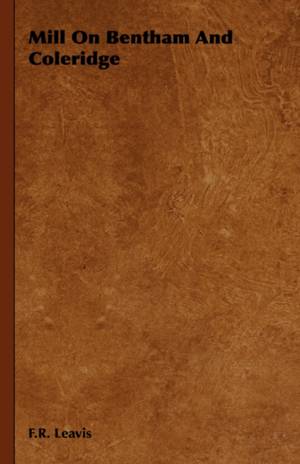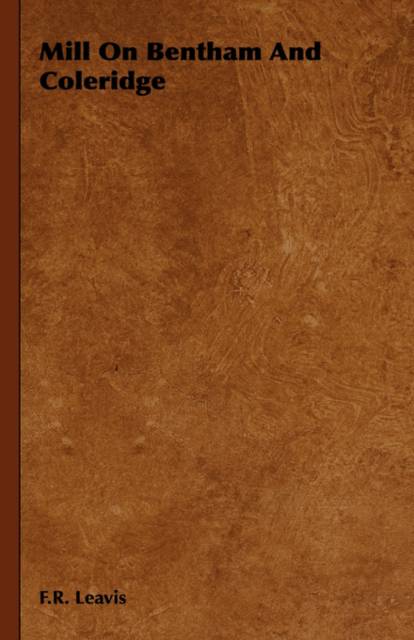
- Retrait gratuit dans votre magasin Club
- 7.000.000 titres dans notre catalogue
- Payer en toute sécurité
- Toujours un magasin près de chez vous
- Retrait gratuit dans votre magasin Club
- 7.000.0000 titres dans notre catalogue
- Payer en toute sécurité
- Toujours un magasin près de chez vous
Description
MILL ON BENTHAM AND COLERIDGE By the same Author THE COMMON PURSUIT REVALUATION NEW BEARINGS IN ENGLISH POETRY EDUCATION ANB THE UNIVERSITY THE GREAT TRADITION With Denys Thompson CULTURE AND ENVIRONMENT Edited by the same Author DETERMINATION MILL ON BENTHAM AND COLERIDGE WITH AN INTRODUCTION BY F. R. Leavis CONTENTS Introduction page Mill on Bentliam Mill on Coleridge INTRODUCTION This present volume represents an ambition to make Mills Bentham and Coleridge current classics for the literary student. But there was more to the actual operative purpose that moved me than this suggests, and for the literary student doesnt, without some explaining, really convey my intention. And in the explaining I have to avow that, essentially, I have been concerned to take a propagandist opportunity. I have been concerned to do something more by way of promoting that particular approach to the problem of liberal education which I outlined in Education and the University. I contend there that while, on the one hand, if the study of literature is to play its central part it must be informed and governed by a more athletic conception of criticism as a discipline of intelligence than it commonly is, on the other a serious study of literature inevitably leads outwards into other studies and disciplines, into fields not primarily literary, and that the problem of liberal education at the university level, particular discipline being duly provided for, is to exploit this outwardleading to the best advantage. A liberal education cannot confine itself to the critical study of literature, and the profit of a real literary training will show itself very largely in otherthan literary fields. It is with the meaAs of cultivating and relating these fields that a serious attempt to grapple with the problem must be very largely preoccupied. This insistence on extraliterary studies may seem superfluous, the need being recognized in time honoured and universal academic practice. My point is that my preoccupation with vindicating the study of literature aswhat it so rarely isa real discipline and one without which there can be no real liberal education carries with it, in the nature of things, a more exacting preoccupation with extraliterary studies than academic practice anywhere bears wit ness to. In the English Tripos, for instance, with which my own work has been associated, the period papers which the candidate has to take are headed Literature, Life and Thought. But no one should suppose from this that candidates for the English Tripos will have been guided through courses of work planned in the interests of an extended and unified understanding of any period or any part of itor anything at all. It means merely that, if an odd candidate, in picking, after a study of back papers, the minimum safe number of topics on which to acquire so much knowledge as will show to advantage in a halfhours to an hours un loading, decides in favour of one coming under Life and Thought, he can count, if he is judicious and moderately lucky, on finding his opportunity. It will be a very unusual and fortunate student who has the grasp, the energy and the character to make it any thing else. Most will not even glimpse what else it might and should be. And if we ask how anything better is to be arrived at, the answer is that nothing substantially better can, under a system that for guidance leaves the student, for the most part, to lectures, and reckons to test his quality by an endofcourse standanddeliver against the clock. Study under such a system inevitably tens to be an acquiring and arranging of clichematerial. The academic authorities believing in such a system will tend to take as their firstclass man a type that may be described as the complete walking clieh6the man its often a woman who unloads with such con fident and accomplished ease in the examinationroom because he has never really grappled with anything,
Spécifications
Parties prenantes
- Auteur(s) :
- Editeur:
Contenu
- Nombre de pages :
- 180
- Langue:
- Anglais
Caractéristiques
- EAN:
- 9781443725903
- Date de parution :
- 04-11-08
- Format:
- Livre relié
- Format numérique:
- Genaaid
- Dimensions :
- 140 mm x 216 mm
- Poids :
- 376 g

Les avis
Nous publions uniquement les avis qui respectent les conditions requises. Consultez nos conditions pour les avis.






